Whether you’re a teen trying to cope with the pressures of school or an adult trying to figure out how to create balance, anxiety can significantly disrupt your quality of life. Let’s explore some common symptoms, causes, and treatments of anxiety to help you understand and manage this condition better.
Symptoms of Anxiety
If you are afraid of anxiety then your body is most likely controlling you and you probably feel helpless. This may be hard to believe, but anxiety is your protector; it is your body’s alarm system, it signals that your system feels threatened which may be due to a memory, a thought, a place or a situation. Try to understand it so you can tame it. Symptoms may differ from person to person. Hopefully this list below will be useful in helping you recognize any symptoms you may have:
- Physical Symptoms: heart palpitations, chest pain, sweating, trembling, shortness of breath, and, dizziness, diarrhea, and trembling.
- Emotional Symptoms: constant worry, fear, irritability, lashing out at others, and feelings of impending doom.
- Behavioral Symptoms: feeling disconnected from yourself, avoidance of certain situations, difficulty concentrating, and restlessness, pacing, and sleep problems.
Can you relate to any of these symptoms? It may be time for you to get some support to help you get a handle on this challenge.
Causes of Anxiety
Often a combination of genetic, environmental, and psychological influences is the source of anxiety problems:
- Genetics: A family history of anxiety disorders can increase your risk, especially if your birth mother was exposed to repeated toxic stress while you were in her womb.
- Brain Chemistry: Imbalances in neurotransmitters, the chemicals that regulate mood, can contribute to anxiety.
- Environmental Stressors: Traumatic events such as racism, abuse, bullying, chronic toxic work stress, financial trauma, and other significant life changes can trigger anxiety. Knowing the root cause of your anxiety can help in developing effective coping strategies.
Treatments for Anxiety
You’re not going to die, anxiety is treatable. Here are some common and effective treatments:
Therapy
While therapy is not the only way to recover from anxiety, it is certainly one of the most effective ways. Note though that it is important that you consider a technique that incorporates the mind and body into the treatment approach. Here are a few effective methods:
EFT Tapping:
Emotional Freedom Technique (EFT Tapping) is highly effective and is a holistic healing method that combines elements of ancient Chinese acupressure and modern psychology. EFT involves tapping on specific points on your body, primarily on the face and hands, while focusing on a particular issue or feeling associated with anxiety. These points correspond to meridians used in traditional Chinese medicine.
Tapping helps calm the body’s stress response and regulates the nervous system. It also rewires the brain to respond differently to stress, and restores balance to the body’s energy system
EMDR Therapy: Eye Movement Desensitization and Reprocessing Therapy EMDR Therapy also involves the use of bilateral stimulation which is typically guided by a therapist to help the brain reprocess distressing memories, reduce its emotional impact and help the person gain new insights. This process reduces anxiety over time.
Mindfulness and Relaxation Techniques: Practices such as meditation, deep breathing, and progressive muscle relaxation can help manage symptoms.
Medications
I’m biased to natural approaches to managing anxiety; however, medications can also be effective. If you plan on taking medications, consider seeing a psychiatrist instead of your primary care doctor. Psychiatrists are trained and specialize in treating mental health related conditions. Commonly prescribed medications used to relieve anxiety symptoms are known as SRIs and SNRIs are commonly prescribed to manage anxiety symptoms and Benzodiazepines. These are short-term medications meant to reduce severe anxiety symptoms. Aim to resolve the issues that are fueling the anxiety so that you don’t develop a dependency on the medication.
Life Changes
- Regular Exercise: Physical activity can significantly reduce anxiety levels by releasing endorphins and improving overall well-being.
- Healthy Diet: A balanced diet rich in nutrients can support mental health. Hydrate, avoid sugar, caffeine and alcohol at all costs.
- Adequate Sleep: Ensure you get enough rest, your body needs sleep to reset, heal. Sleep is crucial for managing anxiety.
- Stress Management: Techniques such as time management, hobbies, and social activities can help reduce stress and anxiety.
Support Networks
- Support Groups: Connecting with others who understand and share similar struggle can be very rewarding and can provide comfort and advice.
- Family and Friends: Having non-judgmental supportive family and friends is for sure impactful in the game of healing. Lean on safe personal support system but don’t assume that the individuals have the capacity to support you. Ask them and ask yourself, have they earned the right to my vulnerability?
Conclusion
Understanding anxiety is the first step toward managing it effectively learn to the symptoms, explore the causes, and seek support and treatments. You too deserve support; you can take control of your anxiety and improve your quality of life.
Subscribe to our blog and join our community of individuals for more information and resources on anxiety management. Together, we can navigate the journey to better mental health.

